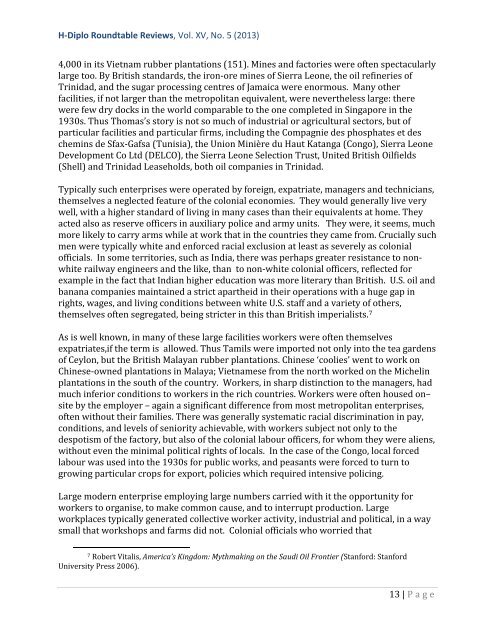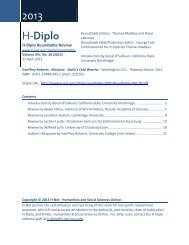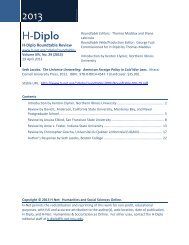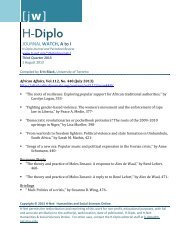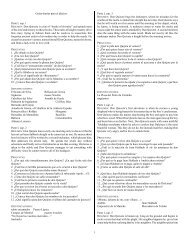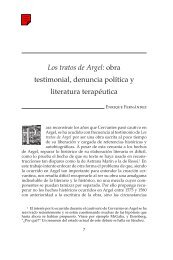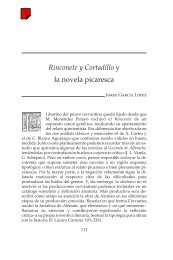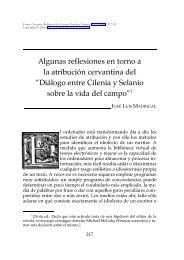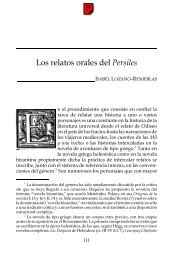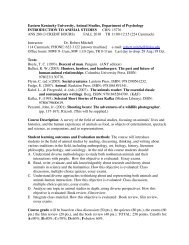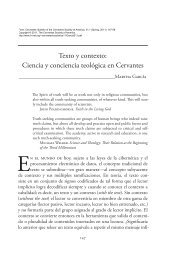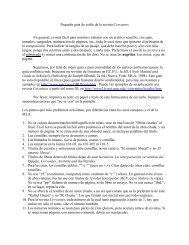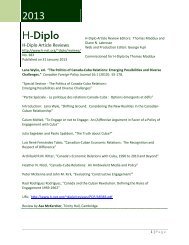H-Diplo Roundtable on Martin Thomas. Violence and ... - H-Net
H-Diplo Roundtable on Martin Thomas. Violence and ... - H-Net
H-Diplo Roundtable on Martin Thomas. Violence and ... - H-Net
You also want an ePaper? Increase the reach of your titles
YUMPU automatically turns print PDFs into web optimized ePapers that Google loves.
H-<str<strong>on</strong>g>Diplo</str<strong>on</strong>g> <str<strong>on</strong>g>Roundtable</str<strong>on</strong>g> Reviews, Vol. XV, No. 5 (2013)<br />
4,000 in its Vietnam rubber plantati<strong>on</strong>s (151). Mines <strong>and</strong> factories were often spectacularly<br />
large too. By British st<strong>and</strong>ards, the ir<strong>on</strong>-ore mines of Sierra Le<strong>on</strong>e, the oil refineries of<br />
Trinidad, <strong>and</strong> the sugar processing centres of Jamaica were enormous. Many other<br />
facilities, if not larger than the metropolitan equivalent, were nevertheless large: there<br />
were few dry docks in the world comparable to the <strong>on</strong>e completed in Singapore in the<br />
1930s. Thus <strong>Thomas</strong>’s story is not so much of industrial or agricultural sectors, but of<br />
particular facilities <strong>and</strong> particular firms, including the Compagnie des phosphates et des<br />
chemins de Sfax-Gafsa (Tunisia), the Uni<strong>on</strong> Minière du Haut Katanga (C<strong>on</strong>go), Sierra Le<strong>on</strong>e<br />
Development Co Ltd (DELCO), the Sierra Le<strong>on</strong>e Selecti<strong>on</strong> Trust, United British Oilfields<br />
(Shell) <strong>and</strong> Trinidad Leaseholds, both oil companies in Trinidad.<br />
Typically such enterprises were operated by foreign, expatriate, managers <strong>and</strong> technicians,<br />
themselves a neglected feature of the col<strong>on</strong>ial ec<strong>on</strong>omies. They would generally live very<br />
well, with a higher st<strong>and</strong>ard of living in many cases than their equivalents at home. They<br />
acted also as reserve officers in auxiliary police <strong>and</strong> army units. They were, it seems, much<br />
more likely to carry arms while at work that in the countries they came from. Crucially such<br />
men were typically white <strong>and</strong> enforced racial exclusi<strong>on</strong> at least as severely as col<strong>on</strong>ial<br />
officials. In some territories, such as India, there was perhaps greater resistance to n<strong>on</strong>white<br />
railway engineers <strong>and</strong> the like, than to n<strong>on</strong>-white col<strong>on</strong>ial officers, reflected for<br />
example in the fact that Indian higher educati<strong>on</strong> was more literary than British. U.S. oil <strong>and</strong><br />
banana companies maintained a strict apartheid in their operati<strong>on</strong>s with a huge gap in<br />
rights, wages, <strong>and</strong> living c<strong>on</strong>diti<strong>on</strong>s between white U.S. staff <strong>and</strong> a variety of others,<br />
themselves often segregated, being stricter in this than British imperialists. 7<br />
As is well known, in many of these large facilities workers were often themselves<br />
expatriates,if the term is allowed. Thus Tamils were imported not <strong>on</strong>ly into the tea gardens<br />
of Ceyl<strong>on</strong>, but the British Malayan rubber plantati<strong>on</strong>s. Chinese ‘coolies’ went to work <strong>on</strong><br />
Chinese-owned plantati<strong>on</strong>s in Malaya; Vietnamese from the north worked <strong>on</strong> the Michelin<br />
plantati<strong>on</strong>s in the south of the country. Workers, in sharp distincti<strong>on</strong> to the managers, had<br />
much inferior c<strong>on</strong>diti<strong>on</strong>s to workers in the rich countries. Workers were often housed <strong>on</strong>–<br />
site by the employer – again a significant difference from most metropolitan enterprises,<br />
often without their families. There was generally systematic racial discriminati<strong>on</strong> in pay,<br />
c<strong>on</strong>diti<strong>on</strong>s, <strong>and</strong> levels of seniority achievable, with workers subject not <strong>on</strong>ly to the<br />
despotism of the factory, but also of the col<strong>on</strong>ial labour officers, for whom they were aliens,<br />
without even the minimal political rights of locals. In the case of the C<strong>on</strong>go, local forced<br />
labour was used into the 1930s for public works, <strong>and</strong> peasants were forced to turn to<br />
growing particular crops for export, policies which required intensive policing.<br />
Large modern enterprise employing large numbers carried with it the opportunity for<br />
workers to organise, to make comm<strong>on</strong> cause, <strong>and</strong> to interrupt producti<strong>on</strong>. Large<br />
workplaces typically generated collective worker activity, industrial <strong>and</strong> political, in a way<br />
small that workshops <strong>and</strong> farms did not. Col<strong>on</strong>ial officials who worried that<br />
7 Robert Vitalis, America’s Kingdom: Mythmaking <strong>on</strong> the Saudi Oil Fr<strong>on</strong>tier (Stanford: Stanford<br />
University Press 2006).<br />
13 | P age


